www.magazine-industry-usa.com
31
'20
Written on Modified on
HEPCOMOTION CASE STUDY
Large rings for big demands: Ring guides provide lasting support/endurance at TRIOPTICS
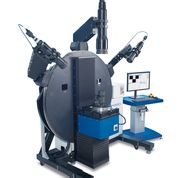
When it comes to rings and curved guides, it is impossible to overlook HepcoMotion. In the fifty years since its inception, the British company has developed its reputation as a specialist in all sorts of linear guides, successfully occupying a niche in this area. That is also how Dr Stefan Krey, Executive Director at TRIOPTICS, feels about HepcoMotion’s product range. TRIOPTICS is one of the leading manufacturers of precision optical testing equipment for the inspection of lenses and camera components. The company has been relying on HepcoMotion's products for a long time. However, for their latest development the ImageMaster® Cine Flex, a high precision optical measurement system, they only found their way to the British provider of linear motion solutions after a detour.
In developing this latest instrument, TRIOPTICS was faced with three major challenges. Firstly, lenses for movie production are much larger and therefore more difficult to handle than normal, smaller and lighter digital camera lenses. Secondly, on top of the already challenging size and weight, the client wanted it to be possible to test the perfect functioning of the lens not only in its horizontal but also in its vertical position while also being able to undertake adjustments in that position if needed. Therefore, the optical measurement system had to be constructed in a manner that would be sufficiently stable without compromising on flexibility. Finally yet importantly, the aim was to create a measurement system that would be able to accommodate up to fifty different lenses. Just to achieve the required distance between the optical testing equipment and the lens that is being tested, a ring with an impressive 1500mm diameter was required. The first prototypes built by the TRIOPTICS team used polymer pinions and rings to achieve the movement actuating the test cameras. However, it turned out that the plastic pinions could not handle the 10kg weight of the test cameras reliably over time. “But a safe and repeatable positioning of the optical testing telescopes was essential to achieve the needed high quality measurement results," explains Dr Krey.
This is why TRIOPTICS contacted HepcoMotion after the first unsatisfactory results using plastic pinions and a toothed belt. "That was it," concludes Dr Krey. HepcoMotion was able to manufacture a ring that met TRIOPTICS design requirements exactly. "We chose a PRT2 ring with integrated gear profile and double-row eccentric bearings," says Krey. "The eccentric bearings can be adjusted to remove play in the system that develops over its lifetime as a result of wear - there is no need to remove and replace the bearings that have worn," explains Mark Völkers, Technical Sales representative for HepcoMotion Germany. Mark was responsible for providing linear motion guidance for the project.
TRIOPTICS’ test machines are shipped across the world, so the ability to easily readjust the bearings is an important feature for customers from a service point-of-view. In addition, the double-row bearings, which comprise a one-piece outer race with two rows of ball bearings, guarantee improved load capacity, service life and strength - essential for handling the weight of the test cameras. “In addition, to minimise the loads on the guidance system, we added a counterweight to the camera assembly," explains Dr Krey. TRIOPTICS designed and manufactured their own carriage plates to ensure a perfect fit with their test cameras and mounted HepcoMotion's bearings to each carriage plate. "No problem for us," says Völkers. "Our products are designed to give the customer freedom of choice to build their own system using components or use one of our pre-fabricated systems. We want to enable designers a great deal of freedom in their design," explains Völkers.
During the measurement process on the test machine, two or three motorised test cameras move approximately seventy degrees to cover the entire field of view of the lens. Whilst these movements are relatively slow at about 10-20cm per second, they must be performed smoothly and with absolute precision. The stainless steel ring and double-row bearings manufactured by HepcoMotion comfortably accommodate the weight of the cameras. The camera lens that is being tested is fixed to a support which is completely independent of the ring. As a result, the entire assembly can be rotated from vertical to horizontal – one of the customer’s key requirements.
"This was quite a lengthy project - it was under development for two years," says Dr Krey. However, for the company it was more important to develop a long-term, perfectly functioning test instrument than to achieve in the short term and take risks on the long-term reliability of a machine. "We wanted to be absolutely sure the machine would function in just the same way 20 years from now and that is now the case”, says Krey. The machine's initial success proves him right: the first five of the ImageMaster® Cine Flex have been delivered to the customer’s branches around the world already and are working to their full satisfaction.
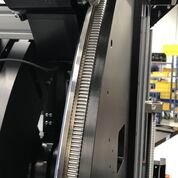
Alternative
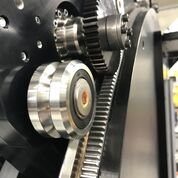
Trioptics used HepcoMotion's PRT2 ring with external gear and mounted it to a round metal baseplate
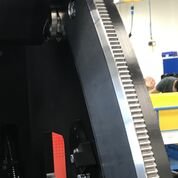
To ensure a perfect fit, Trioptics combined their own carriage plates and pinion with HepcoMotion's double - row bearings.
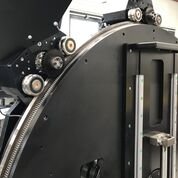
HepcoMotion's double - row V bearings and PRT2 ring with integrated gear form provide precision and stability.

